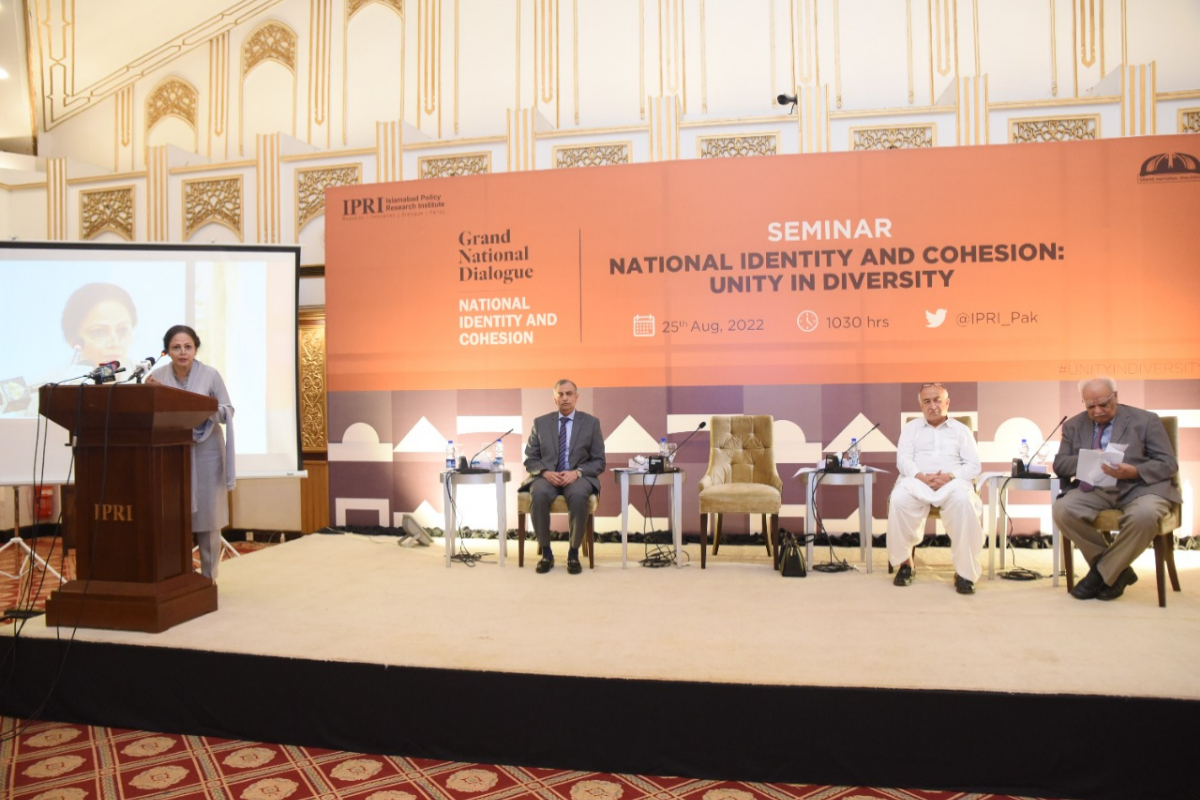ISLAMABAD: The country is in the need of structural reforms, coupled with stringent implementation which demands political will and peoples’ support, an official said.
Minister for State for Finance and Revenue, Dr Aisha Ghaus Pasha while addressing a Grand National Dialogue on ‘National Identity and Cohesion’, organised by the Islamabad Policy Research Institute (IPRI), stressed for the need of a broad-based national consensus to ensure cohesion and unity among the ranks and files of the nation.
The dialogue is part of the series brain-storming discussion under the aegis of the IPRI for harnessing commonality of views, and bringing together stakeholders, policy makers and people from academia and other walks of life.

Dr Pasha said that Pakistan has repeatedly knocked at the doors of the International Monetary Fund (IMF), and has availed 23 programmes since 1990.
The minister for state said that the country is in an IMF programme because it is unable to balance needs and requirements. Pakistan’s import cover is enough only for a month or so, as forex reserves have nosedived, she added.
She pointed out the problems of current account deficit, slumping exports, an uncontrollable import wish list, and argued that the way out is to learn to live within our resources. She said austerity is indispensable as the country is in a debt of more than $130 billion.
The country needs around $34 billion this year to stay afloat. She, however, remarked that the country is well placed as far as finances for next one year are concerned.

The minister said that the budget deficit last year was 10 per cent of the GDP, which is untenable. She underscored the need for addressing the sense of deprivation prevalent at the moment, adding that economic equality and inclusive growth is the way to go.
She also pointed out problems inherent in the tax collection mechanism and the eroding trust in it. She stressed on evolving a policy parameter on human development, slashing imports and buffering the economy with local expertise.
Dr Pasha said that 22 per cent of landholding is in the hands of two per cent people. This discrimination is scuttling growth and prosperity, she remarked.
“We lost our vision of human development to the personal interests and ambitions of the politicians. Despite being the sixth most populated country, we are the lowest in the human development index,” she said.
Improving governance, resource mobilisation, accelerating growth, balanced regional development with focus on human development, would demand a unified response for building a strong nation. “This is how Pakistan can evolve and foster social cohesion and patriotism,” she noted.
While opening the session, IPRI President Ambassador Dr Raza Muhammad (Retd) observed that the seminar is focused on understanding identity and to comprehend cohesion.
He recalled the principles of the Father of the Nation, ‘Unity, Faith and Discipline’, to underscore that this is what is desired at the moment by the nation. It is time to do away with corruption, nepotism and ad-hocism that has unfortunately crept in the body-politick, he added.
Former foreign secretary Ambassador Riaz Mohammad Khan (Retd) was of the view that Pakistan’s struggle was very simple, and with the passage of time it has been compounded into a confusion.
He referred to the speech of Muhammad Ali Jinnah on August 11, 1947, to the Constituent Assembly in Karachi, and said that it still forms the preamble of the nation as it move to attain cohesion and unity.
The religious diversity and history were also the country’s identity markers, he said, adding that Indus and its rich civilisation should not be ignored.
Former chief minister Balochistan, Dr Abdul Malik Baloch said that nothing will change for good until people elect genuine representatives, and come out of the elitism trap.
He said that complete democracy, federal system, supremacy of people’s rule, and acceptance of diversity and languages are the hallmarks for a safe and secure tomorrow, and this is how political and economic progress can be attained.
Linguist Jamal Shah said that languages should come to act as a binding force, and it is high time culture is patronised and promoted without any discrimination.
The veteran artist said that Pakistan draws inspiration from a culture that dates back to 9,500 years, and it is an asset of oneness in the diverse society.
Former governor of Khyber Pakhtunkhwa and Balochistan Owais Ahmed Ghani said that Pakistan is a natural state and unlike India, has weathered all storms.
Former senator and minister Roshan Khursheed Bharucha said that Balochistan is deep in an identity crisis, as it has been ignored and discriminated against for the last seven decades.
She also brought up the issue of missing persons and negation of merit in the desolate province. Pakistan’s problem is elite versus the deprived, and this has to be addressed, she added.

















